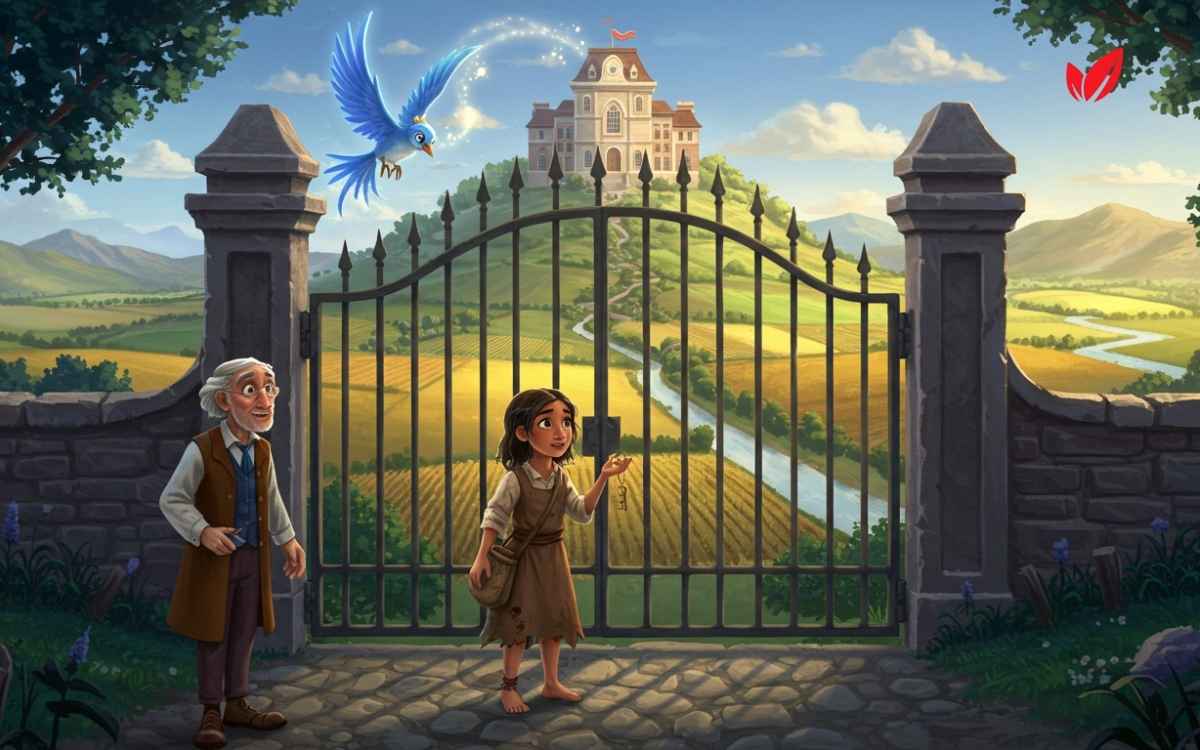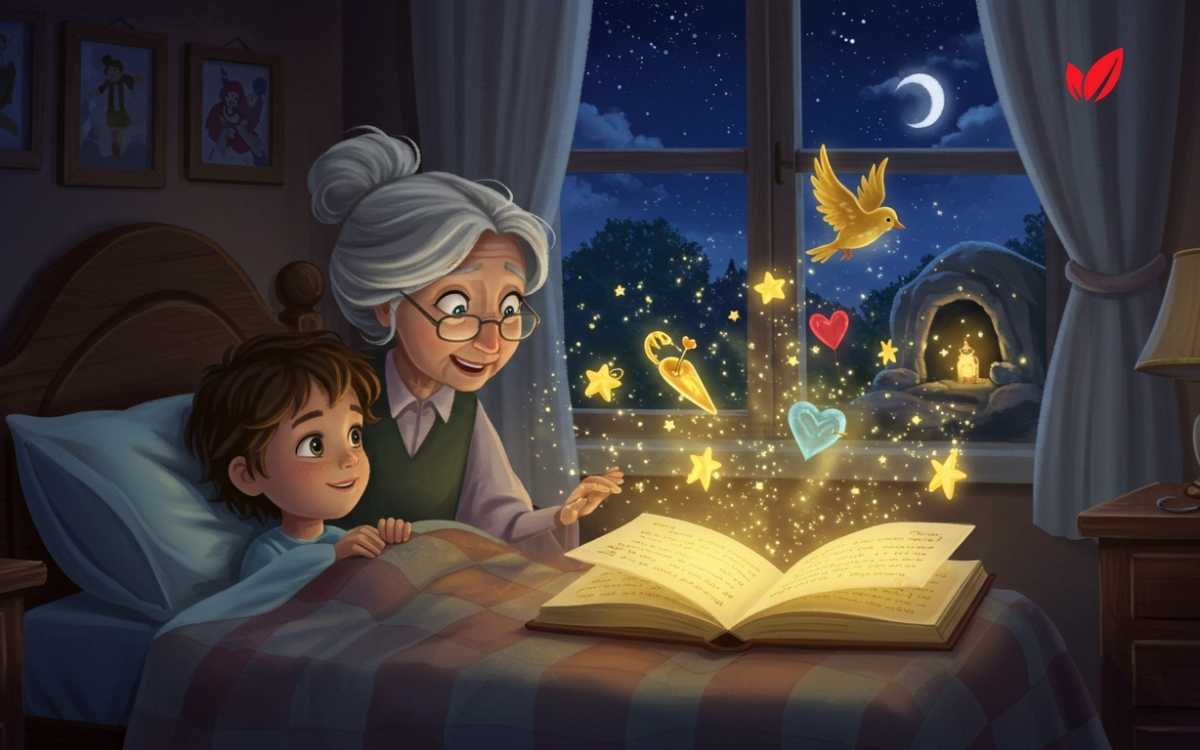Once upon a time Story… these simple words open the door to a world where anything can happen. A poor girl meets a magical bird, a donkey tells the truth, or a brave child finds light in a dark cave. Bedtime stories like these are more than just tales they help us dream, teach us kindness, and remind us that even the smallest heart can carry the biggest hope. Perfect for quiet nights, soft pillows, and sleepy eyes.
A Beggar Touched a King’s Foot
Once upon a time, in a faraway land, there lived a king named Veer. He was strong, brave, and rich. His palace had tall golden gates, walls covered in red stones, and guards who never smiled. People feared him, but they also respected him. Every morning, he sat on his high throne and listened to problems from the people.
One summer day, King Veer planned to walk through the main street of his kingdom. It was the festival of lights, and people were busy decorating their homes. Flowers hung from windows, children played with colorful paper toys, and music filled the air.
The king wore a bright green robe and a crown that shone in the sun. His guards walked before him, clearing the way. As he passed, people stepped aside, bowing with respect.
In a corner near the old temple, sat a beggar named Mohan. His clothes were torn, his face was covered with dust, and he had no shoes. Mohan had not eaten since the day before. His hands trembled, but his eyes still held some hope.
As the king walked by, Mohan stood up and called out, “Your Majesty, please help me.”
The guards shouted at him, “Move back!”
But Mohan didn’t move. Instead, he fell to the ground and touched the king’s foot. The crowd gasped. No one had ever done that. It was not allowed. The guards rushed forward to beat him.

“Stop,” the king said.
Everyone froze.
King Veer looked down at Mohan. His eyes narrowed. “Why did you touch my foot?” he asked.
Mohan looked up, eyes wet. “Because I had nothing else to offer. No gold, no gifts, not even food. So I gave the only thing I had left—my respect.”
The king stood silent. The crowd waited. Even the birds in the trees seemed to pause.
Then, slowly, the king bent down and helped Mohan to his feet. “Tell me your name,” he said.
“Mohan,” the beggar whispered.
“You are not a beggar from this day,” the king said. “You are now the keeper of my garden.”
The people gasped again. Mohan looked around, confused. “But I don’t know how to grow plants,” he said.
“You gave me more than most do,” said the king. “You gave me honesty. That is enough.”
So Mohan moved into the palace garden. He watered the plants every morning, picked weeds in the afternoon, and spoke kindly to every flower. Slowly, the garden grew more beautiful than ever before.

Years passed. Mohan became old, but his heart stayed full. Every child in the kingdom came to him for stories. He told them this one, again and again:
“One day, I touched a king’s foot, not to beg, but to show that even the poorest heart can carry true respect.”
The king, too, often visited the garden, not to give orders, but to listen.
Moral:
True respect comes from the heart. It does not need gold, fine clothes, or loud words. A kind heart can change even the strongest king.
She Opened a Mysterious Book
Once upon a time: In a small village at the edge of a quiet forest lived a girl named Ria. She was twelve years old, loved to ask questions, and spent most of her time near the old library. The library was made of stone, with a wooden door that creaked every time someone opened it. Most children found it boring, but Ria found it magical.

One rainy afternoon, while thunder rolled in the sky, Ria ran into the library to stay dry. The place was empty. Even the old librarian was missing. She looked around and smiled. It felt like a place full of secrets.
She walked past tall shelves filled with books that smelled of old paper. She stopped when she saw a thick book on a low wooden table. It had no title, no writer’s name. Its cover was dark green, and a golden lock held it shut. But the lock looked loose, as if waiting for someone.
Ria touched the cover. The lock fell open with a soft click. Her heart beat fast.
She slowly opened the book.
Nothing happened at first.
Then a bright light rose from the pages. It was soft and warm, not scary at all. The light shaped itself into a woman’s face, smiling kindly.
“Hello, reader,” said the glowing face. “You are the first one in a hundred years to open this book.”
Ria’s eyes widened. “Who are you?”
“I am the spirit of wisdom. This book holds one question for you. Your answer will shape your life.”
The pages turned by themselves and stopped at a blank one. Then, in golden letters, words began to form:
“What is more important: to be smart or to be kind?”
Ria thought hard. She had heard her teachers praise smart students. She had seen clever people get good jobs and win prizes. But she also remembered the baker who gave extra bread to hungry children, and her neighbor who helped an old woman cross the road.
She looked at the page and said, “To be kind.”
The light glowed brighter. The book’s pages turned into butterflies and flew around her. Then, slowly, they disappeared.
Ria blinked. The book was gone. In its place lay a small silver pin shaped like a heart. She picked it up. The moment she touched it, she felt a warmth in her chest, like sunshine on cold hands.
From that day on, strange things began to happen.
When Ria spoke kindly to someone, their day got better. When she helped a classmate, they smiled more. When she hugged her mother, her mother’s tired face lit up.
She never told anyone about the book. But she wore the heart-shaped pin every day. It reminded her of her answer.
Years later, Ria became a teacher. She was not the richest or the most famous. But her students remembered her forever.
Because every word she said came from a kind heart.
Moral:
Being smart is good. But being kind makes the world a better place.
Donkey Spoke the Truth
Once upon a Time, Long ago, in a village surrounded by hills and rivers, there lived a farmer named Raghu. He was a simple man with a small piece of land, five chickens, and a very old donkey named Bholu.

Bholu was not fast. He couldn’t carry heavy loads anymore. His ears were too big, and his legs bent a little when he walked. Most people made fun of him. Children laughed, and even other farmers told Raghu to sell him or leave him in the forest.
But Raghu didn’t listen. “He’s been with me since I was a boy,” he would say. “He may be old, but he has a good heart.”
One hot afternoon, something strange happened.
Raghu tied Bholu to a tree and went to cut grass in the fields. A breeze blew through the leaves, and the world was quiet.
Then Bholu spoke.
Not in brays or grunts. But in clear, calm words.
“These people,” he said to no one, “they laugh at me. But they don’t see the truth.”
A sparrow sitting on the tree above almost fell off the branch. “Did you just talk?”
“Yes,” said Bholu. “I always could. I just never had anything important to say. Until now.”
That evening, Raghu came back and untied him. Bholu looked at him and said, “Raghu, I have something to say.”
Raghu dropped his sickle. “You… you can talk?”
“Yes,” Bholu said. “And I need you to listen.”
Raghu was shocked but nodded slowly.
“You are kind,” said Bholu. “But you work too hard and never ask for help. Your back hurts, your roof leaks, and you still smile. That’s not strength. That’s silence. Go ask the village head for support. You helped build this village, remember?”
Raghu blinked. “You want me to ask for help?”
“Yes,” Bholu said. “Kindness without care for yourself is not wisdom.”
Raghu told the village what happened. People laughed at him. “A talking donkey? Has he lost his mind?”
But one boy believed him. Then an old woman said she remembered hearing animals talk in stories her grandmother told. By evening, the news had spread across the hills.
The village head came to see Raghu. “Let me speak to this donkey,” he said, half-smiling.
Bholu looked him in the eye and said, “You sit in a big house while the farmers grow your food. Visit their homes. See their roofs. Taste their water.”
The head turned pale. “You… you speak the truth.”
He called a meeting the next day. For the first time, the farmers spoke openly. They asked for clean water, new tools, and better roads. The village changed after that.
No one laughed at Bholu again.
Children came to feed him. People sat near him, hoping to hear more. But Bholu never spoke again. Just that one time.
When asked why, Raghu would smile and say, “He spoke once, and that was enough.”
Moral:
Sometimes, the truth comes from the quietest voices. Listen before you laugh.
This Little Boy Entered a Dark Cave… and
Once upon a Time, In the heart of a green valley, there was a small village called Nandpur. The people there were kind and lived simple lives. But there was one place everyone feared—the Black Cave.

The cave stood at the foot of a hill, surrounded by tall rocks and dry trees. No birds flew near it. No animals made sounds around it. People said the cave was cursed. Some said a ghost lived inside. Others believed it swallowed voices and never gave them back.
Children were warned never to go near it.
But one boy didn’t listen.
His name was Kabir.
He was ten years old, full of questions, and had a head full of dreams. He loved stories about treasure, lost kingdoms, and magic. One evening, while walking home from the river, he passed the cave. The wind was still. The air felt strange.
He looked at the mouth of the cave and whispered, “What are you hiding?”
Kabir stood there for a while. Then he did something no one else dared to do.
He stepped inside.
At first, it was just darkness. The kind that makes your skin cold. He walked slowly, touching the wall to guide himself. The silence was thick. His heart beat loud, but he kept going.
Suddenly, he heard a sound.
Not a growl. Not a scream.
But… crying.
Soft, sad crying.
He followed it and saw a faint glow ahead. He moved closer and found something that made him freeze.
It was a boy. About his age. Sitting on a rock, holding his knees, glowing faintly like moonlight.
Kabir said, “Who are you?”
The boy looked up. His eyes were full of pain. “My name is Veer. I got lost in the cave many years ago. I was scared. I shouted for help, but no one came.”
Kabir stepped closer. “How long have you been here?”
“I don’t know,” Veer said. “Time is different in here. I wait. But no one comes close.”
Kabir asked, “Why don’t you come out?”
Veer said, “I can’t leave unless someone truly listens to me. You did.”
The cave began to shake. The glow grew brighter. Then, with a loud whoosh, the light filled the whole space. Kabir closed his eyes.
When he opened them, he was standing outside. The sun was shining. Birds were singing. The village stood ahead, just like before.
But something was different.
In his hand, Kabir held a small wooden toy soldier. It had the name Veer carved on it.
He ran home and told everyone what had happened. At first, no one believed him.
Then an old woman stepped forward. She said, “My brother’s name was Veer. He went missing in that cave fifty years ago. He had a toy just like that.”
The village fell silent.
They no longer feared the cave. Instead, they built a small stone wall around it with flowers and a sign that read:
“Some voices are trapped by silence. Set them free by listening.”
Kabir grew up to be a kind man, one who always made time to listen—to people, to stories, even to silence.
Moral:
Listening is not just with ears, but with the heart. Some people don’t need help—they just need to be heard.
They Laughed at the Poor Girl’s Dream
Once upon a Time: A village surrounded by fields and rivers, lived a girl named Tara. She had no fine clothes, no big house, and no family except her grandmother, who sold clay pots to buy rice each day.

Tara had one dream—to study in the school on the hill. It was not just any school. It had tall glass windows, a big library, and teachers who wore suits and spoke in soft voices. The children who studied there came in carts with golden wheels and had shiny shoes that clicked when they walked.
But Tara had no books. No shoes. No cart.
When she told the village children her dream, they laughed. “You?” they said. “You sell pots! That school is not for you!”
Tara didn’t reply. She just smiled and helped her grandmother pack the pots.
One evening, after the market closed, Tara walked to the old tree near the river. She sat under it, humming a song her mother used to sing. The sky turned orange. The wind whispered through the leaves.
Suddenly, a small bird landed on a branch above her. It had blue feathers and a gold ring around its neck.
“You look sad,” the bird said.
Tara jumped. “Did… did you just talk?”
“Yes,” said the bird. “I don’t waste words, but I saw your heart.”
Tara blinked. “You saw my heart?”
“I did,” the bird said. “You have no gold. No books. But you have a dream—and dreams are heavy to carry alone.”
The bird flew down and placed something in her hand. It was a tiny golden key.
“What is this for?” Tara asked.
“Take it to the school,” the bird said. “You’ll know what to do.”
The next morning, Tara walked to the school on the hill. Her feet hurt. Her dress was torn. The guard at the gate laughed. “You again?”
She showed him the key.
His face changed. He ran inside. A moment later, the principal came out. He was an old man with white hair and kind eyes. He looked at the key, then at Tara.
“Where did you find this?” he asked.
“A bird gave it to me,” she said.
The man smiled. “This key was given to the founder of this school by his mother. It was lost many years ago. We searched everywhere. How did you find it?”
Tara looked up at the sky. The bird was gone.
“I didn’t find it,” she said. “It found me.”
The principal nodded. “Then you’re meant to be here.”
Tara was given books, shoes, and a seat by the window. She read every page with care, listened to every word, and helped others in the library.
Years passed. Tara grew into a wise teacher and later became the head of the same school.
And every year, on the first day of class, she would place a tiny golden key on her desk and say to her students:
“Never laugh at someone’s dream. It may be quiet today, but one day it may open the door to something beautiful.”
Moral:
Dreams do not need money to grow. They need courage, and someone to believe in them—even if it’s a bird.








